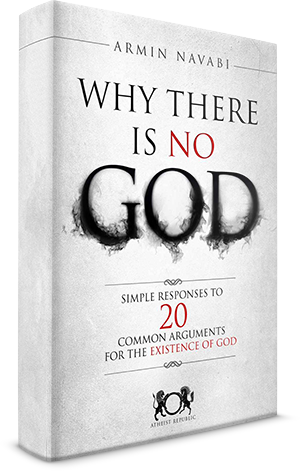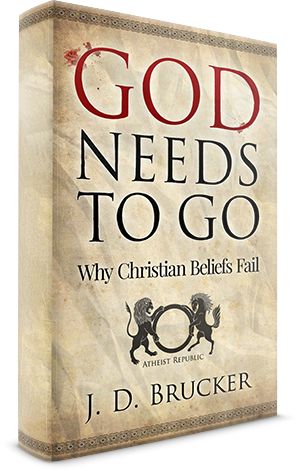Beliefs Without Foundation For Christians
Donating = Loving
![]()
Bringing you atheist articles and building active godless communities takes hundreds of hours and resources each month. If you find any joy or stimulation at Atheist Republic, please consider becoming a Supporting Member with a recurring monthly donation of your choosing, between a cup of tea and a good dinner.
Log in or create an account to join the discussions on the Atheist Republic forums.




























@Whitefire Re: Being in the deep end
By golly, you are a natural, m'Lady.... *flourishing bow*.... Welcome to the Deep End.
Christian claim -
Old Man Shouts...
I think the existence of the disciple Peter/Cephas is as certain as the existence of Saul of Tarsus. Saul/Paul refers to him directly. Clearly, Bart Ehrman thinks Peter is a historical figure.
@ Lying
think the existence of the disciple Peter/Cephas is as certain as the existence of Saul of Tarsus
I will certainly agree with that statement...ermmm what was the evidence for Saul of Tarsus again?
Saul/Paul refers to him directly. Clearly, Bart Ehrman thinks Peter is a historical figure.
Aaaand here we go again:
There is no contemporary evidence for a Peter or Simon Peter outside of the gospels. None. No life, no death , nothing. Having said that "A" Peter according to Paul existed "one question often brought up is this: Is the Peter who led a very Jewish sect of Christianity, the same as the Peter who would later stand by Paul (a Hellenist) and be bishop of his Churches, and is either of these actually Simon Peter, the "right hand" of Jesus?"(Wiki)
Now read that sentence in quotes again, make sure you actually get the meaning....ask yourself would a very very Jewish orthodox Peter stand by a hellenist, already declared Apostate by the Temple in Jerusalem?
Answer; very unlikely to be the same person who allegedly deserted the Jesus figure on the cross or who became "bishop" in the nascent Latin church.
Definitely NOT the author of 1 Peter which Bart Ehrmann concludes in his blogs.
This where apologists like yourself always get it wrong by making sweeping statements and not looking at the reality of the 1st century and the origins of their church.
And once again you misdirect on Ehrmanns conclusions. I suggest instead of googling and posting your replies where you think they agree with your presuppositions you quote the author and his EXACT conclusions. Not as cut and dried as you want to believe.
I recommend you read the following link before you misquote Bart Ehrmann again: https://thebestschools.org/special/ehrman-licona-dialogue-reliability-ne...
Lets keep you as honest as you can be eh?
(Edit spelling)
Christian claim -
Old Man Shouts...
How come so many really really smart, super rational, clear thinking atheist skeptics concede the historicity of Jesus of Nazareth? They never accept claims without evidence.
Therefore, either there IS evidence for the historical Jesus...OR those rational atheists aren't as clever as the conspiracy theorists who say Jesus never existed.
Or the paucity of evidence lends itself to no solid conclusion either way, and of course you could have Jesus's fucking DNA, it wouldn't making him anything but human, or the supernatural claims assigned to him anything but ignorant unevidenced archaic superstition from people who didn't know diseases were spread by germs, and not by demons that could be exorcised into pigs and then chased off a cliff. Citing atheists who accept Jesus was an historical figure is pretty fucking hilarious anyway, made me grin until my jaw aches.
Incidentally I think you missed this...
https://www.atheistrepublic.com/forums/debate-room/bible-contradiction-h...
@Lying twat
How come so many really really smart, super rational, clear thinking atheist skeptics concede the historicity of Jesus of Nazareth? They never accept claims without evidence.
Therefore, either there IS evidence for the historical Jesus...OR those rational atheists aren't as clever as the conspiracy theorists who say Jesus never existed.
Another fallacious appeal to authority, and without foundation.
As I have asked you before...if you have contemporary (to the alleged lifetime) of the jesus figure as described in the gospels than now is the time and place to demonstrate it.
So far we have only your assertions and apologetics. Your call.
Put up or shut up....you know what EVIDENCE is, right?
(edit to remove insults)
@Old man shouts
I say, That was ver restrained of you. In that frame of mine I would have called him a crunt.
Do you think he knows what a 'twat' might be?
Saul of Tarsus - Paul - is contemporary to the lifetime of Jesus.
Oh wait...you don't believe he existed either.
@ Lying in his bed
Saul of Tarsus - Paul - is contemporary to the lifetime of Jesus.
Oh wait...you don't believe he existed either.
Don't fucking strawman me you shit. I have never said a jesus did not exist. Anyone can look back at all my posts since I came on this site and see that. You? you have done nothing but lie.
Now, back on topic, so let us have this evidence you claim for Saul of Tarsus shall we? And don't forget to include all the contemporary references (excluding biblical texts) so we know that you are also talking about the 'Paul' who wrote the epistles? If not explain why you are deviating from your church dogma?
Oh. again I will not be holding my breath.
@lion
"Saul of Tarsus - Paul - is contemporary to the lifetime of Jesus.
Oh wait...you don't believe he existed either."
Don't remember anyone here saying that. But I'm old and forgetful .Perhaps you can refresh my mind
Anyway, seeing as you raised Saul :
I really don't know if he existed. He could have. I'm still currently reading a biography of Saul called " Paul: The Mind Of The Apostle" by A N Wilson. He seems convinced of an historic Saul Of Tarsus who became Paul The apostle (follower) of the Jesus we see in his letters.(The gospels were written AFTER Paul's putative epistles.) Problem with the Pauline epistles, is there are currently five pretty much accepted as being forgeries.
I'm enjoying Wilson's book. However, he is no christian apologist. He's an atheist as far as I know. . I think a literalist evangelical would become apoplectic reading Wilson's book .
So, I remain agnostic about the historicity of Saul of Tarsus. However, I don't try to minimise the effect of writings attributed to him on the sect which became what we call christianity. Some scholars have gone so far to suggest that the religion should be called "Paulism"
The religion called 'christianity" did not spring forth whole and homogeneous in the middle of the first century. There were literally dozens of sects claiming Jesus as their founder. The matter began to be resolved in the fifth century. It was then the emperor Theodosius made the sect the state religion of the Roman empire. It was he who popularised the name "christian ". Before that, many followers of Jesus simply called their religion 'The Way'
It was Theodosius who allowed and encouraged the persecution of 'pagans' and 'heretics " .By 'persecute' I mean the burning of any books not in the official canon and the murder of any and all pagans and heretics they could find. The church did that for the next thousand years. After the protestant reformation, sects turned on each other. Each sect murdered its own definition of "heretics" whenever possible. That continued until the tend of the seventeenth century
Even if the bible wasn't called "The Bible" it would still be a historical reference to a person named Saul of Tarsus who, at one time, was a Jewish authority figure actively engaged in persecuting the rapidly growing community of followers of the person named Jesus, Whom you believe never existed.
As such, Saul of Tarsus is an inconvenient truth for you and your Jesus myther conspiracy crew. So you (understandably) want to now question his existence by saying stuff like...there's no evidence for Jesus/Saul once you exclude all the evidence for Jesus/Saul.
@ Lying in bed
s such, Saul of Tarsus is an inconvenient truth for you and your Jesus myther conspiracy crew. So you (understandably) want to now question his existence by saying stuff like...there's no evidence for Jesus/Saul once you exclude all the evidence for Jesus/Saul.
Ermm, once again you are misrepresenting what I wrote. I was quite clear....outside the biblical texts what evidence do you have for this Saul of Tarsus?
Any? NO? Then he goes into the "not proven basket" . Certainly not a "truth".
This may seem inconvenient for you but history depends on facts, no supposition or wishful thinking.
All you offer is presuppositional apologetics. No evidence at all despite many times of asking.
Oh and once again I am not a "jesus myther" as anyone on these forums who read my posts will attest I am anything but a "jesus myther" .
Obviously you can add comprehension difficulties to your other problems.
@ Lion IRC
It isnt at all clear if Saul/Paul is even referring to J.C. as a real person, or if Paul is talking about an invented person that he claimed was referred to in the scriptures. There were lots of mystery religions where sects claimed to be able to read hidden messages from the scriptures at the time that christianity was invented. Paul never met anybody named jesus, & everything he claims to know about him are from 'visions'.
As far as I am aware, there are also no non biblical references to paul. Surely an itinerant preacher such as paul, who was supposed to have converted thousands, who apparently was able to perform miracles according to acts, & who was also apparently arrested on a no. of occasions, & was apparently beheaded in rome, would have drawn the attention of one of the historians of the time. Yet just like jesus, the history books are strangely silent on this guy. Its almost as though he never actually existed in reality, or if he did, was a much lesser figure than is claimed in acts.
There is also no evidence that saul/paul persecuted anybody. That is the claim, but it could merely be an allegorical story to show that bad jews can become good christians.
So rather than this paul/saul fellow being an inconvenient truth, he is just another shadowy mystery figure that was possibly invented by the church. Yes there are letters from somebody claiming to be this guy, but only about 6 of 13 are thought to be genuine. But maybe none of them at all are genuine, & are just more of the myth making machine of the early church.
Of course all of this is conjecture on my part, & I may be off the mark, however the whole history of the early church is basically conjecture. It is impossible to know what is true & what isnt, because apart from what is written in the N.T., there are virtually no other contemporary sources to confirm anything that is in it.
The reason the christian religion if 'fath' based, is because there is no other choice than to believe on faith. There is certainly no credible evidence to support any of it!
@ilovechloe
You - Bible scholars agree/disagree that 6 of Paul's letters are genuine.
Me - You mean the ones in the bible?
You - Yes.
Me - How can bible scholars conclude this if there's no evidence outside the bible?
See, you are using an evidentiary double standard.
You"ll cite scholarly opinion as to the authorship of Paul's epistles- and their opinions are based on the content of a historical document called 'the bible'.
But according to you, the only evidence we can use in relation to Paul must come from sources outside the bible.
@ Lion
and once again your rank and obvious dishonesty kicks in.
Textual analysis proves the gospels were NOT eyewitness accounts.
Textual analysis indicates that the first 3 epistles are by the same author. That several others are an anthology of letters edited, redacted and embellished by later hands. That Titus and 2 Timothy are much later forgeries.
We do not know the identity of the author of these epistles.
You conflate history and historiography. Perhaps you should really get t know your subject before making such a public fool of your self on these forums.
OMS: We don't even need to go to a Textual Analysis. The Gospels were written Mark (66-70 AD) Matthew and Luke (85 to 90 AD) John (90 to 110 AD) It's utter and complete nonsense to assume one of the authors met or even remembered Jesus as they would have been a toddler even if they did live to the ripe old age of 60 without dying from some infection, disease, starvation, or just the harshness of life and old age.
@Old Man shouts
Yair.
Fascinating stuff
Currently half way through my book 'Paul; The Mind Of The Apostle" by A N Wilson, one of my favourite historians.
At this stage I'm a bit conflicted. Wilson makes a pretty good case for the historicity Of Saul of Tarsus. It seems pretty clear, that like Jesus, Saul MAY have existed. That his effects on the Christians church may be far greater than Christian like to admit. Some writers have gone so far as to claim 'christianity' should be called "Paulism'
I've been long aware that at least six of Paul's letters are considered forgeries by many historians, but that there is no actual consensus. As with Jesus I think the historicity of Paul and the authorship of his letters is irrelevant to believers.
IMO ,although both Jesus and Paul MAY have existed, Christian (and other) beliefs are based on faith, not reality. Neither the Torah nor the New Testament are history. Their contents are pretty much myth, even though they may be based on some historical persons.
Having said that, I'm only a dilettante , not a biblical scholar. It also seems to me most unlikely that I will ever be able to make any truth claims, no matter how many books I read. . A common problem when trying to learn about ancient historical figures. As far as I can tell, a lack of contemporary evidence is the norm rather than an exception.
It bemuses me that christian apologists we get here do not tend to be the Biblical scholars implied by their posts. They seem very comfy in making the most absurd claims a with zero actual evidence. I find it very difficult to suffer fools such as our current crop, and get quickly bored. I make no apology for that.
I admit to being gratified seeing these gits handed their heads on a regular basis.
(((((((((((((((((((((((((((((()
"There is nearly universal consensus in modern New Testament scholarship on a core group of authentic Pauline epistles whose authorship is rarely contested: Romans, 1 and 2 Corinthians, Galatians, Philippians, 1 Thessalonians, and Philemon. Several additional letters bearing Paul's name are disputed among scholars, namely Ephesians, Colossians, 2 Thessalonians, 1 and 2 Timothy, and Titus. Scholarly opinion is sharply divided on whether or not Colossians and 2 Thessalonians are genuine letters of Paul. The remaining four contested epistles – Ephesians, as well as the three known as the Pastoral epistles (1 and 2 Timothy, and Titus) – have been labeled pseudepigraphical works by most critical scholars.[4][5][6] Some scholars have proposed that Paul may have used an amanuensis, or secretary, in writing the disputed letters.[7]"
https://en.wikipedia.org/wiki/Authorship_of_the_Pauline_epistles
@ Cranky
Yes I do find it fascinating, and also fascinating the advances in historiography, archeology and other history disciplines that have changed the face of ancient history particularly in the last 15 years.
There may well be a sort of case for a "Saul of Tarsus" but at present there are no references to this person outside the bible texts. One would be justified in expecting that such a successful traitor to the Jewish hopes would have been documented if not by his alleged sponsors (the Romans) but at least by his bitter sworn enemies...the zealots. So a "Not Proven" there
Similarly "paul" we know is a figure..but was he that infamous Saul of Tarsus or was that a construct, a later "salvation story" to bolster "paul's" reputation?
The manifest contradictions between Paul's own accounts of his travails and those in Acts almost lead me to suspect they were two different people, certainly our friend 'Luke' (whoever that writer was) could not be travelling with "paul" and simultaneously telling us he was somewhere else. ...and for all we know of "paul" outside those texts (nothing) they probably were two different people.
As I have said before, the existence of a "paul" who wrote of an imaginary friend who gave him instructions which he passed on the the various sects, temples and gatherings of gentile christians in the mid 1st century is pretty much a 'yes, a writer calling themselves Paulus" did exist.
A jesus figure as described in the gospels? Highly improbable. There is nothing in contemporary records of the first third of the 1st century that hints at such a miracle working figure.
That an all too human proto jesus figure existed? Not a skerrick of evidence so must be "Not proven" (see the verdict in Scottish Law.)
hey seem very comfy in making the most absurd claims a with zero actual evidence.
well, the poor loves have often been 'apologeticised" to near death by their ill educated Pastors and Priests. They are actually just regurgitating vast chunks of uninvestigated presuppositionalism. It is a shame that not one theist who frequents these halls of perfidy actually looks anything up..they just google and repeat the first answer that agrees with their presupposition.
Like a famous PM of Australia...they can be considered the suppositories of wisdom.
(edit, spelling and clarity)
@ Lion IRC
"Even if the bible wasn't called "The Bible" it would still be a historical reference"
The bible is not a historical reference but a collection of folk tales, just like the Brothers Grimm .
@Lion IRC: You mean we use the Gregorian Calendar based on dates of events than never happened?
So the existence of a calendar system with a Year 1 based on a specific event is proof that such an event actually happened?
Then I take it you also see the legend of Romulus and Remus as historical fact, since 753 BCE, the year in which Romulus the wolf boy supposedly founded Rome, was Year 1 in the Roman Ab urbe condita (from the founding of the city) calendar system.
@ persecution if Jesus never existed.
Christians don't believe Attis or Dionysus or any other pagan god existed but pagans were willing to be martyred for their beliefs. What's the difference ?
Honestly I will never understand this reasoning. Every religion in history has events, ceremonies, wars, rituals, culture, events and travels based around their gods, real or not, so why do Christian's think that the existance of their religion is proof of the existance of their god?
Sound reasoning Mikhael.....
@Mikhael
I think a pagan is only partially mistaken about God - not entirely.
If they say Dionysus or Zeus or Ra, I know who they mean.
So in that sense, it's quite reasonable that they would be willing to be martyred for their sincere (and correct) belief that God in some shape or form exists. All forms of theism are in unanimous agreement about this.
And in that same regard, it is the entire institution of theism, not just individual denominations, saying that the existence of theism is sensory experience/evidence of some form of Higher Being(s).
@ Lion
And again we see you playing word games: it is the entire institution of theism, not just individual denominations, saying that the existence of theism is sensory experience/evidence of some form of Higher Being(s).
The entire experience of theism is delusional sensory experience. It is NOT evidence.
Ahahahahahahahahahhahahahahahahahahahahahahahahahahahahahahahahahhahahahahahahahahahahahahahahahahahahahahahahahhahahahahahahahahahahahahahahahahahahahahahahahhahahahahahahahahahahahahahahahahahahahahahahahhahahahahahahahahahahahahahahahahahahahahahahahhahahahahahahahahahahahahahahahahahahahahahahahhahahahahahahahahahahahahahahahahahahahahahahahhahahahahahahahahahahahahahahahahahahahahahahahhahahahahahahahahahahahahahahahahahahahahahahahhahahahahahahahahahahahahahahahahahahahahahahahhahahahahahahahahahahahahahahahahahahahahahahahhahahahahahahahahahahahahahahahahahahahahahahahhahahahahahahahahahahahahahahahahahahahahahahahhahahahahahahahahahahahahahahahahahahahahahahahhahahahahahahahahahahahahahahahahahahahahahahahhahahahahahahahahahahahahahahahahahahahahahahahhahahahahahahahahahahahahahahahahahahahahahahahhahahahahahahahahahahahahahahahahahahahahahahahhahahahahahahahahahahahahahahahahahahahahahahahhahahahahahahahahahahahahahahahahahahahahahahahhahahahahahahahahahahahahahahahahahahahahahahahhahahahahahahahahahahahahahahah.....
uh oh, damn it, irony overload.
They get awfully angry and violent with each other considering they all fundamentally agree, christ but this is one of the most hilarious posts for a while. Not surprising mind, coming as it does from someone who claims face to face means literally face to face in the bible, but also does not mean face to face at all....in the bible...hilarious.
@Lion...” in that sense, it's quite reasonable that they would be willing to be martyred for their sincere (and correct) belief that God in some shape or form exists...”
...not only die, but also kill.
Which brings me to my question from before. The written “word”. This idea of god transmits history/rules/purpose/stories (etc) and the humans that write it say or “claim” inerrancy. How do you determine which book claim of inerrancy? I had used the Koran before (as a book whose followers make the same claim as some Christians, ie you do, but not all Christians). Hope my question is clear.
@Whitefire13
I don't think the quran is entirely false.
Many statements made in the quran agree with the Old and New Testaments.
As for errors, I acknowledge them where they exist - just like the patently obvious errors in non-canonical texts like the gnostic gospels.
Thanks
I remember from your other post (I can’t even remember what thread that was in) you said about the same thing. That’s consistent. I like that. And I would agree with you that the Koran contains errors. However my agreement with you doesn’t make it true...or false. An Islamic Apologist might go into great depths ( and they do) to explain how we’ve misread or we don’t understand, etc, etc.
Or the Jewish religion that reject the Christian New Testament scripture (they don’t accept Jesus in about the same way Christians don’t accept the foretold Comforter) - they don’t see it as inerrant.
Setting (as best as we both can) bias aside, how can a person determine a claim of “inerrancy”?
@ Lion. ..I moved your answer back because it’s less confusing (3 different threads).
OK
Whitefire13 asks "how can a person determine a claim of “inerrancy”?"
The same as for any other controversial/contested truth claim.
Evidence. Logic. Principle of Sufficient Reason. Shared epistemology. Whether the claim is more plausible than its negation. Corroboration. Peer review.
This applies in the case of establishing Canon as well. Believe it or not, biblical theists are concerned with the question of whether fact claims about God are TRUE or FALSE. And there are millions/billions of instances of claims about something done by God which aren't in the bible, and yet are accepted as true by bible-believing theists. The bible itself affirms that the bible simply isn't big enough to include every single, (factual) human interaction with God - let alone all the semi-factual or downright false claims about God's actions.
In a simple terms, the test applied to errancy/inerrancy Canonical/Non-Canonical is;
- Does the claim cohere with or contradict that which is already known. The New Testament can't contradict the Old Testament or else it wouldn't be Canonical. The Book of Mormon or the Quran might have certain claims that accord with the Old Testament but if they contradict the Old Testament why would we include them in Canon?
They can stand or fall on their own. Mormon and Muslim apologists can defend their own 'book'.
- Does the claim ADD anything new? I could write the gospel according to Lion IRC but it wouldn't add anything new. It wouldn't tell us anything we don't already know about God from existing Canon.
@Lion
...Whitefire13 asks "how can a person determine a claim of “inerrancy”?"
And setting aside “bias”. The reason I added that was because had you been raised in a different area of the world, you would have a different viewpoint on the book claiming inerrancy. And even being raised in Utah (lol). It’s difficult to approach a question “unbiasedly” that’s why I said as best we can...
...The same as for any other...”truth claim”
Evidence. Logic.
Agreed. I can agree to this basis. I apply this approach with news (Coronavirus right now being an issue all over) etc. It’s a sensible approach.
...Principle of Sufficient Reason.
I had to look this up. I hadn’t heard this wording before and I’m not sure what it had meant, and I don’t like assuming or reading into what I think others are saying. The first small explanation was that everything must have a reason or cause. Is that what you meant? Is it sort of “something” caused the writers to write?
...Shared epistemology. Whether the claim is more plausible than its negation.
I’m just repeating back. Shared religious “idea” and whether a claim adds to/clarifies or contradicts. This is where, I would think, the doctrines emerge and the specifics of language use/ meaning comes into play. I agree that each religion has its detailed oriented people and scholars.
...Corroboration.
Agreed. Again, basic meaning of “ evidence which confirms or supports a statement, theory, or finding; confirmation”
...Peer review...
I’ve used the term loosely in regards to the bible in other threads, because it doesn’t meet the scientific method “meaning” of peer review (I’ve usually defined how I’m using it). In what way are you using it? Like, straight up scientific method peer review or ...?
Gonna grab a coffee. When I have conversations I like clear conversational meanings. There’s nothing worse than both of us going off at each other over what we think the other means or said, when that may not be what they meant or they “said it wrong”...
Pages